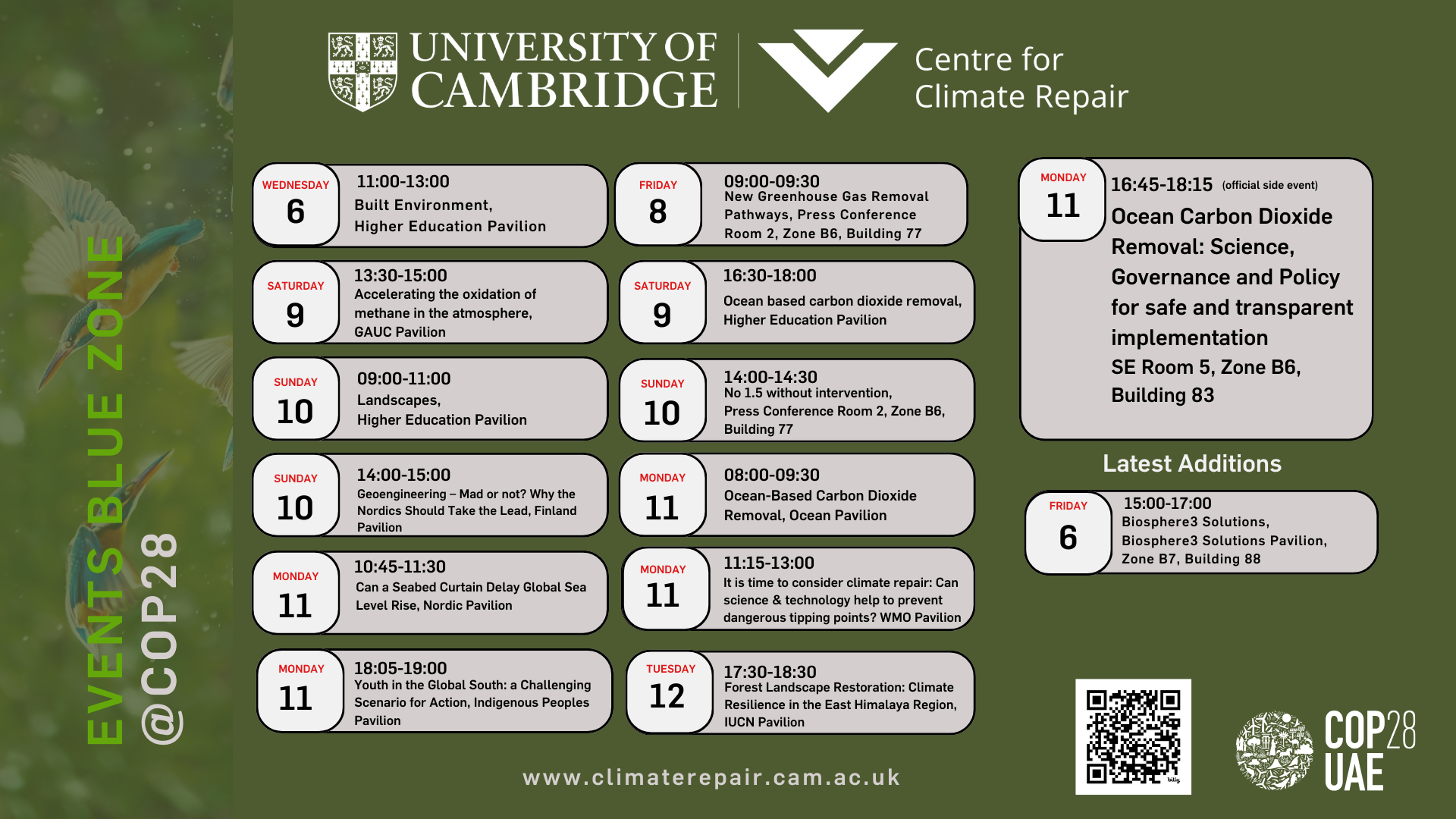
COP28
We are delighted to share with you all the events we are hosting/participating as speakers. Please see below for full list. We have also added a link to the Blue Zone map here.
Detailed Programme
(updated 06/12/2023)
6 December
11:00-13:00: Built Environment, Higher Education Pavilion, Zone B7, Building 90 (note on the COP28 map there is a typo. It says "George Washington University")
This event will explore the critical role of the built environment in our journey towards net zero and beyond. The creation of new and refurbishment of existing parts of the built environment and the subsequent and ongoing operation is responsible for >50% of the emissions of greenhouse gases in some areas of the world. And yet there are significant opportunities to reduce emissions across the supply chain as part of efforts to improve the quality of life for people across the world.
We will examine the opportunities to reduce energy consumption in existing and new buildings through adoption of energy efficient practices, some of which are new but a number of which draw upon knowledge from indigenous communities as to how to cope with extremes in weather. We will discuss the technical aspects of changes to our built environment and also the social, legal, financial, and trust issues which surround the construction industry in part of the world, and how these might be overcome or at least lessened.
Most of the event will focus on decarbonisation of the built environment but we will also introduce new ideas by which it can be a sink for greenhouse gases – both in terms of the embodied carbon of products as well as active removal of greenhouse gases through operation of the built environment.
We will review the opportunities and challenges associated with development of technologies and scale-up for new designs and materials.
Speakers: Shaun Fitzgerald, Director, Centre for Climate Repair, University of Cambridge; Caroline Ray, Regional Director ARUP East Africa (virtual); Chris Trott, Head of Sustainability, Foster & Partners; Eugenie L. Birch, Lawrence C. Nussdorf Chair of Urban Research and Education and Co-Director of the Institute for Urban Research at University of Pennsylvania; Esther Adhiambo Obonyo, Executive Director, Global Building Network, Pennsylvania State University; Ans Irfan, Climate Security Fellow, Center for Climate and Security, Council on Strategic Risks & Affiliate Faculty, Milken Institute School of Public Health, George Washington University; Mohammad Khalid, Vice-President and General Manager for Middle East and Africa, Johnson Controls
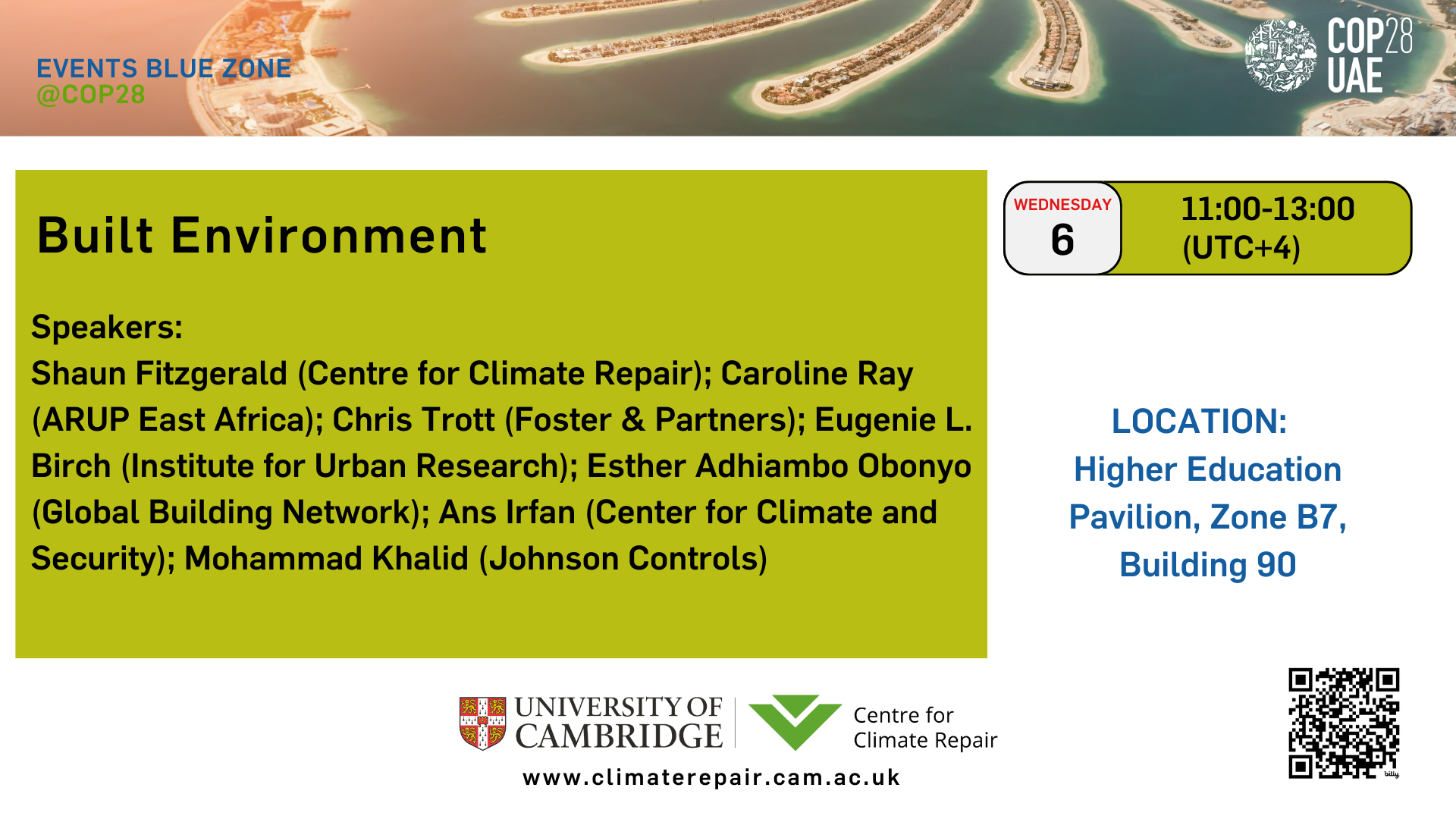
15:00-17:00: Biosphere3 Solutions, Zone B7, Building 88
Biosphere 3 has been in close communication with the UAE Oxford and Cambridge Alumni Society for over a decade and together we are utilizing our respective networks of people to find practical and reliable green solutions. We are confident that we can bring together a platform-based organization to address climate change. We will be inviting a number of UAE Oxford and Cambridge Alumni Society members who are already contributing to the advancement of society as a whole in the fields of construction, logistics, education, energy, and technology. This time, the stage of COP28 will be utilized to come together to further explore solutions.
Speakers: Rob Jackson, Built Environment Expert; Sadia Khan, Former Commissioner, Securities & Exchange Commission of Pakistan (SECP); Katherine Bruce, Sustainability, ESG, Climate Change Expert; Jaison John, Senior Adviser, Sustainability and Climate Change; Shaun Fitzgerald, Director, Centre for Climate Repair, Cambridge University; James Maughan, Chair, UAE Oxbridge Alumni (moderator)
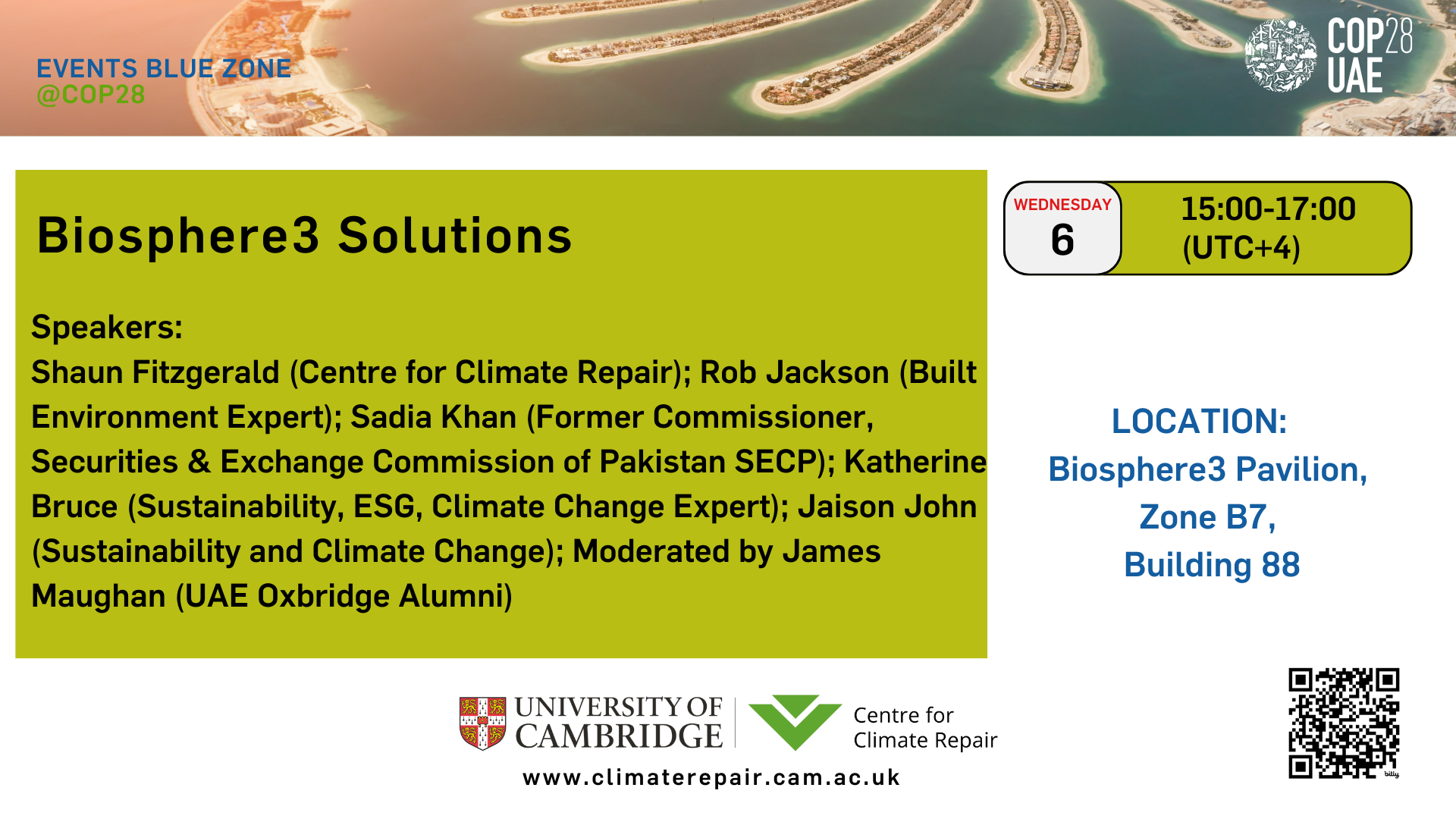
8 December
09:00-09:30 New Greenhouse Gas Removal Pathways, Press Conference Room 2 - Zone B6, Building 77 (Media Advisory)
The panel will discuss how new and emerging greenhouse gas removal (GGR) approaches can play an important role in tackling climate change. The panel will discuss the different characteristics of the various approaches, and how these need to be considered holistically. Characteristics include the scalability and removal potential, degree of permanence and risk of reversal, the timescales associated with scale-up, the impacts on people and the environment, the economics, and social factors including acceptability. The panel members have different areas of expertise and knowledge, and will share their experiences in both assessing the different approaches as well as accelerating their development in the field.
Chair Regina Valdez, Speakers: Shaun Fitzgerald, Centre for Climate Repair, University of Cambridge (methane), Paul Holthus, World Ocean Council, Chelsey Baker, National Oceanography Centre, Amy Ruddock, Carbon Engineering, Soyoung Oh, Perspectives Climate Group, Germany
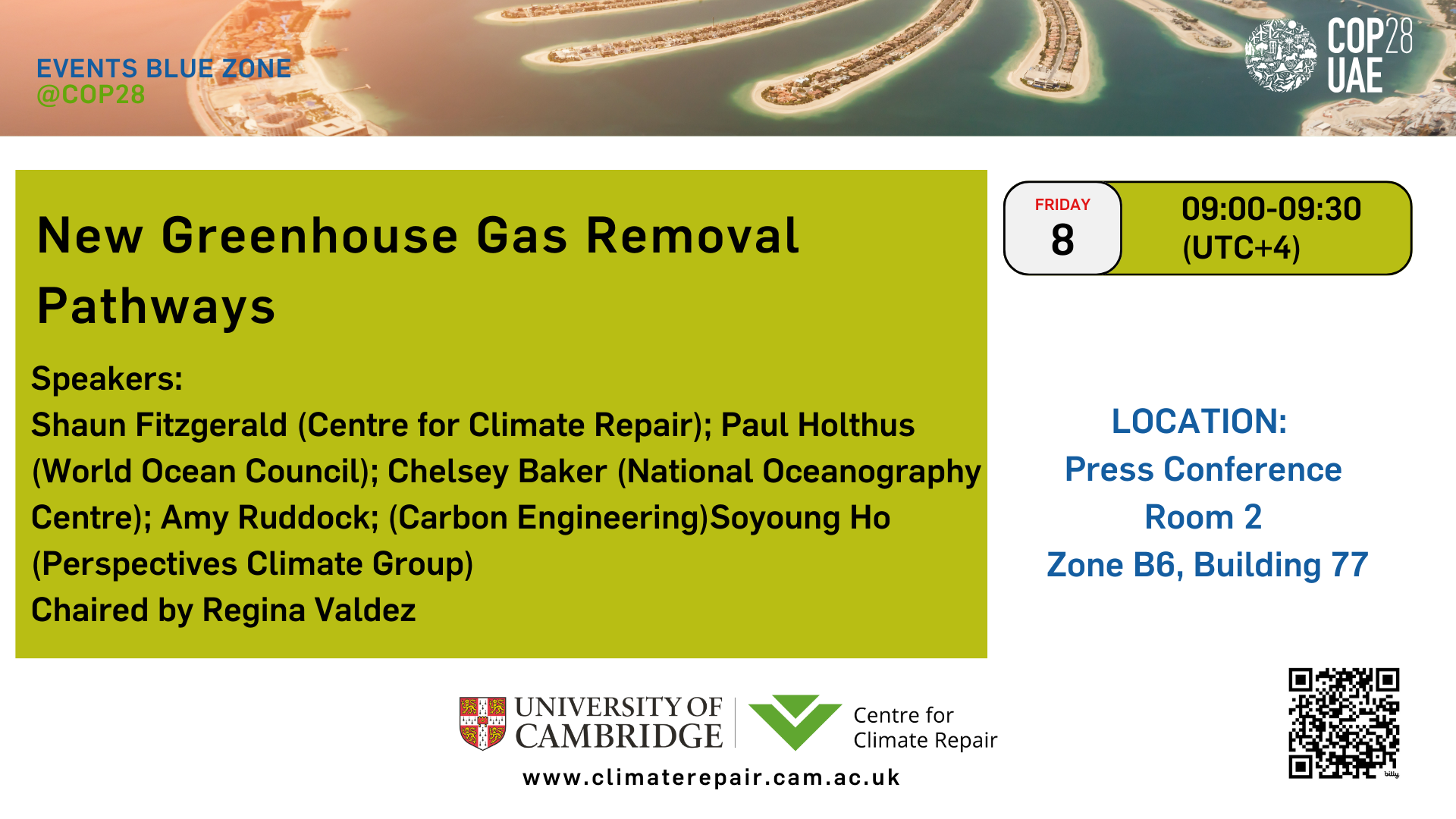
9 December
13:30-15:00 Accelerating the oxidation of methane in the atmosphere, Global Alliance of Universities on Climate (GAUC) pavilion, Zone B7, Building 90
This event will highlight the role of atmospheric methane in the atmosphere and its contribution to climate change, and review the sources. Types of localised point sources will be summarized, following by the opportunities and challenges associated with addressing them. However, the session will focus mostly on non-localised sources or localised sources which are very difficult to stop, and how we might therefore provide ways by which the oxidation of atmospheric methane might be accelerated.
We will discuss different approaches including photocatalysts, electrocatalysts, thermal catalysts, zeolites, and gas to gas systems.
We will review the potential industrial applications of these approaches and explore the challenges associated with scale-up and deployment, and discuss a roadmap of different stages of development which we need to consider.
Speakers: Shaun Fitzgerald, Director of Research for Cambridge Zero and Director of Centre for Climate Repair, University of Cambridge, Wei Li, Senior Lecturer in Chemical Engineering – University of Edinburgh (virtual), Zhiguo Yi, Chinese Academy of Sciences – Fuzhou, China (virtual), Elilini Hoole, PhD Student, University of Cambridge, Wilfried Rickels, Director, Global Commons and Climate Policy Research Center, Kiel Institute for the World Economy, Germany, Adam Boies, Professor in Department of Engineering, University of Cambridge, Matthew Stanley Johnson, Professor in Department of Chemistry, University of Copenhagen (virtual), Maarten van Herpen, Founder and Managing Director, Acacia Impact Innovation BV, The Netherlands (virtual) Moderator: Antoinette Nestor, Engagement Manager, Centre for Climate Repair, University of Cambridge
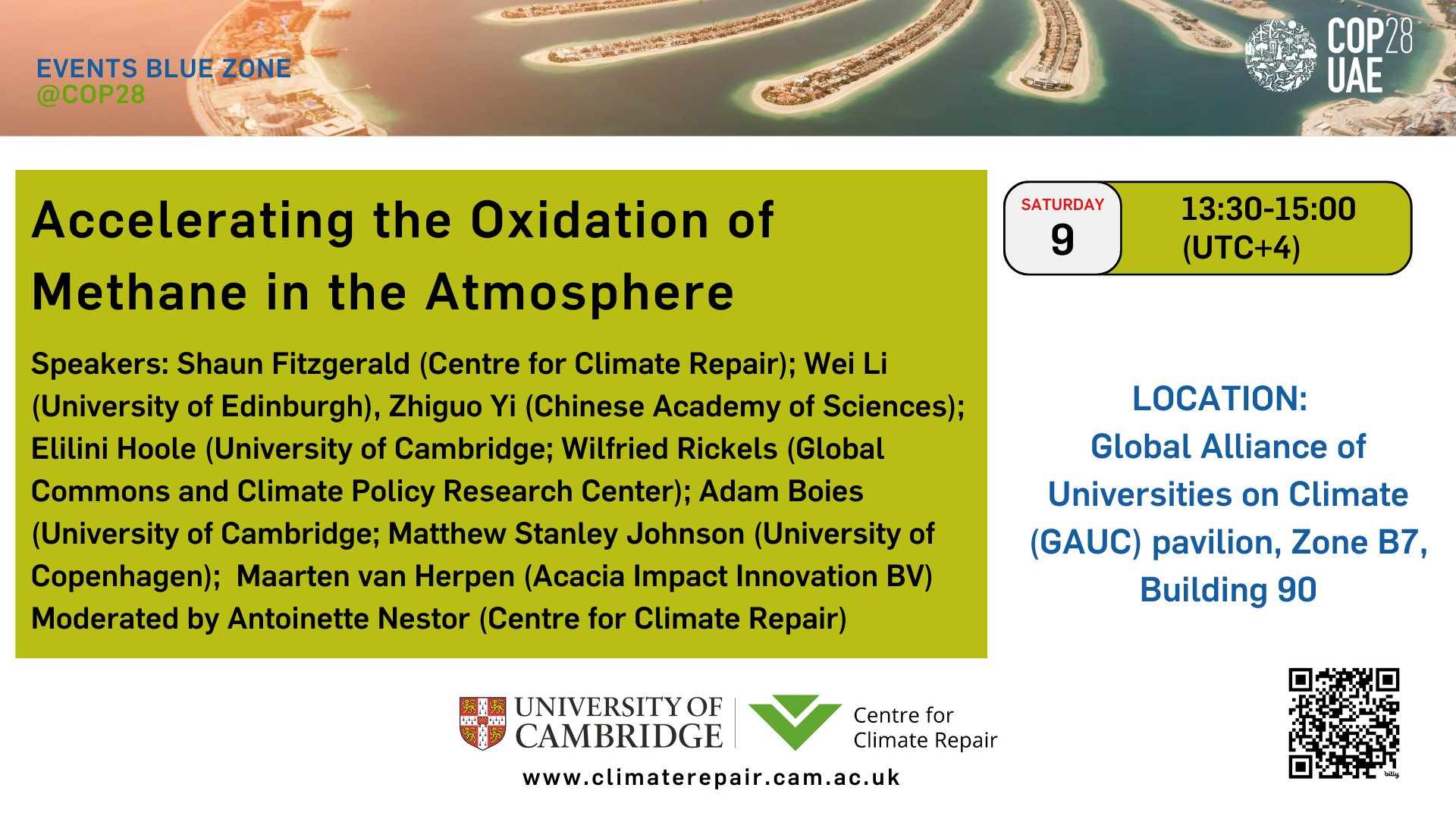
16:30-18:00 Ocean based carbon dioxide removal, Higher Education Pavilion, Zone B7, Building 90 (note on the COP28 map there is a typo. It says "George Washington University")
This event will explore how the oceans might be leveraged further in absorbing carbon dioxide. It will discuss different approaches, their physical and ecosystem characteristics, benefits to communities whose livelihoods are reliant upon the ocean and how they can play central roles in determining the future.
The event will discuss how the different approaches might be compared not only in terms of their capacity to enhance sequestration of carbon dioxide but also in terms of other ecosystem, adaptation, broader development goals and community benefits.
It will highlight the challenges associated with not just potential scale-up of different approaches but even the undertaking of research to further our knowledge base and discuss how these challenges might be overcome.
Speakers: Shaun Fitzgerald, Centre for Climate Repair, University of Cambridge, UK, Wilfried Rickels, Director, Global Commons and Climate Policy Research Center, Kiel Institute for the World Economy, Germany, Kerry Nickols, Senior Programme Officer, Ocean Visions, USA, Ken Buesseler, Senior Scientist, Woods Hole Oceanographic Institution, USA, Paul Holthus, Founding President and CEO, World Ocean Council
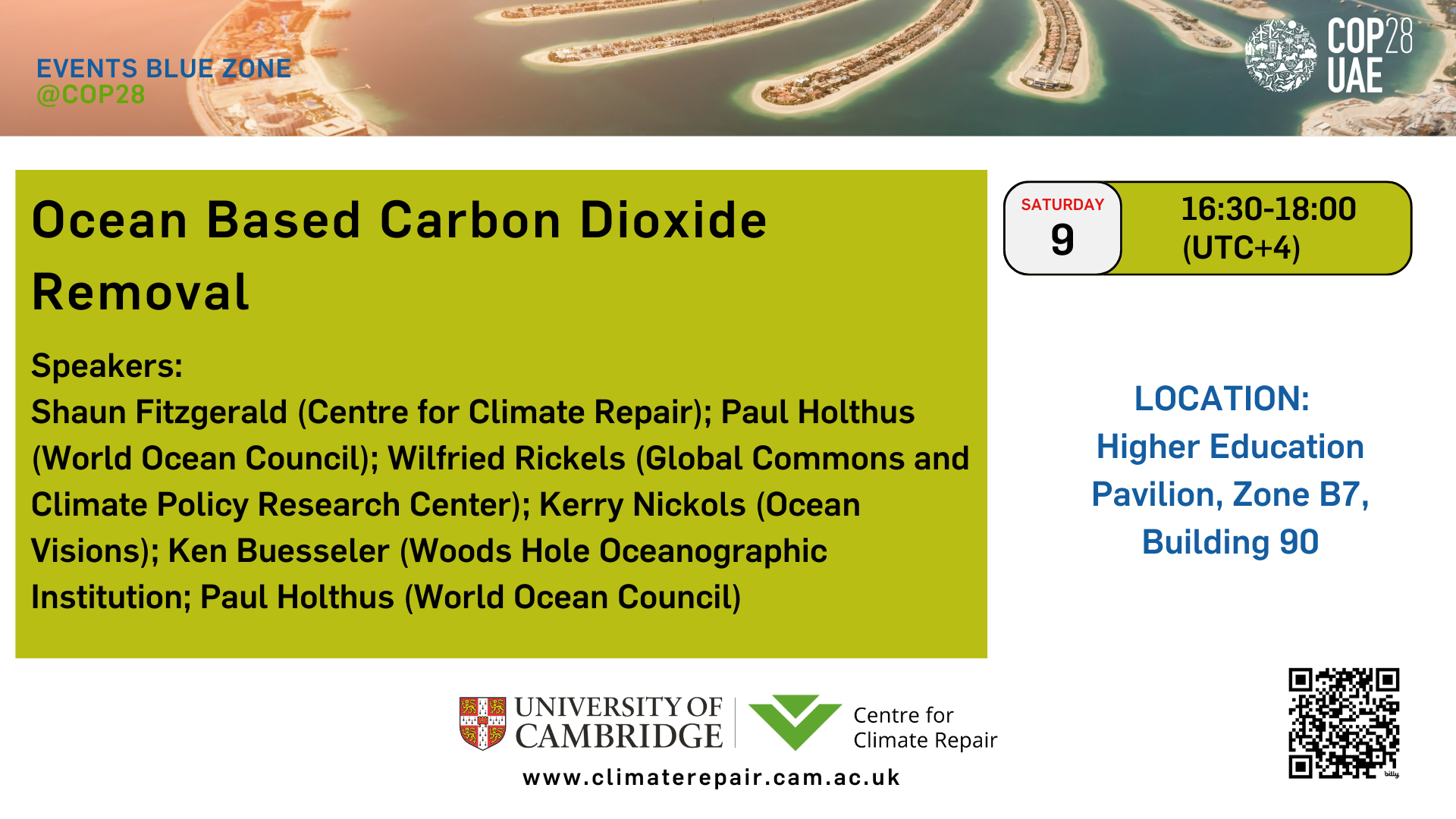
10 December
9:00-11:00 Helping Landscapes Help the Climate, Higher Education Pavilion, Zone B7, Building 90 (note on the COP28 map there is a typo. It says "George Washington University")
This event will explore the critical role of how we manage landscape to support our journey towards net zero and beyond. Humankind continues to manage different landscapes, often with the detrimental impact of increased emissions and/or reduced ability of the landscape to absorb carbon dioxide. And yet, with careful management, managed landscapes can provide a significant contribution to a net-zero world.
We will first explore the role of nature-based solutions and how different forms thereof have different characteristics and importantly different degrees of permanence and risk of reversal. We will discuss how issues of permanence can be compared by presenting a framework to aid our thinking. We will then expand on this by presenting a case study from Brazil, a country with a vast array of landscape and with particular challenges associated deforestation and the need for economical support.
We will then move onto the issue of BECCS, one of the nature-based methods of greenhouse gas removal which is considered in a number of the IPCC reports. Whilst this approach can lead to carbon dioxide storage in old oil and gas reservoirs and therefore be considered long term storage (albeit there are always risks and uncertainties), it is an approach with a complex supply chain and challenges with assessment in terms of counterfactuals and non-CO2 effects such as biodiversity. We will then introduce the opportunities and challenges associated with other wood products as a means of sequestering carbon dioxide.
Lastly, we will introduce the challenge of managing land for net zero emissions whilst also facing the challenges we face in terms of providing food for humanity and also use of land for other purposes. This challenge is set to become more difficult as eating habits change, world population grows, and as climate change unfolds with concomitant problems associated with increased severity and frequency of severe weather events and loss of crops, and sea level rise.
Speakers: Shaun Fitzgerald, Director, Centre for Climate Repair, Cambridge, UK; Audrey Wagner, Programme Coordinator, Nature Based Solutions Initiative, University of Oxford; Aline Soterroni, Research Fellow, Nature Based Solutions Initiative, University of Oxford; Olivia Wallis, Junior Consultant, Climate Policy Research & Consulting, Perspectives Climate Group, Germany; Soyoung Ho, Perspectives Climate Group, Germany; Heiko Balzter, Director of the Institute for Environmental Futures, University of Leicester, UK; Muhammad Huzaifa, University of British Columbia
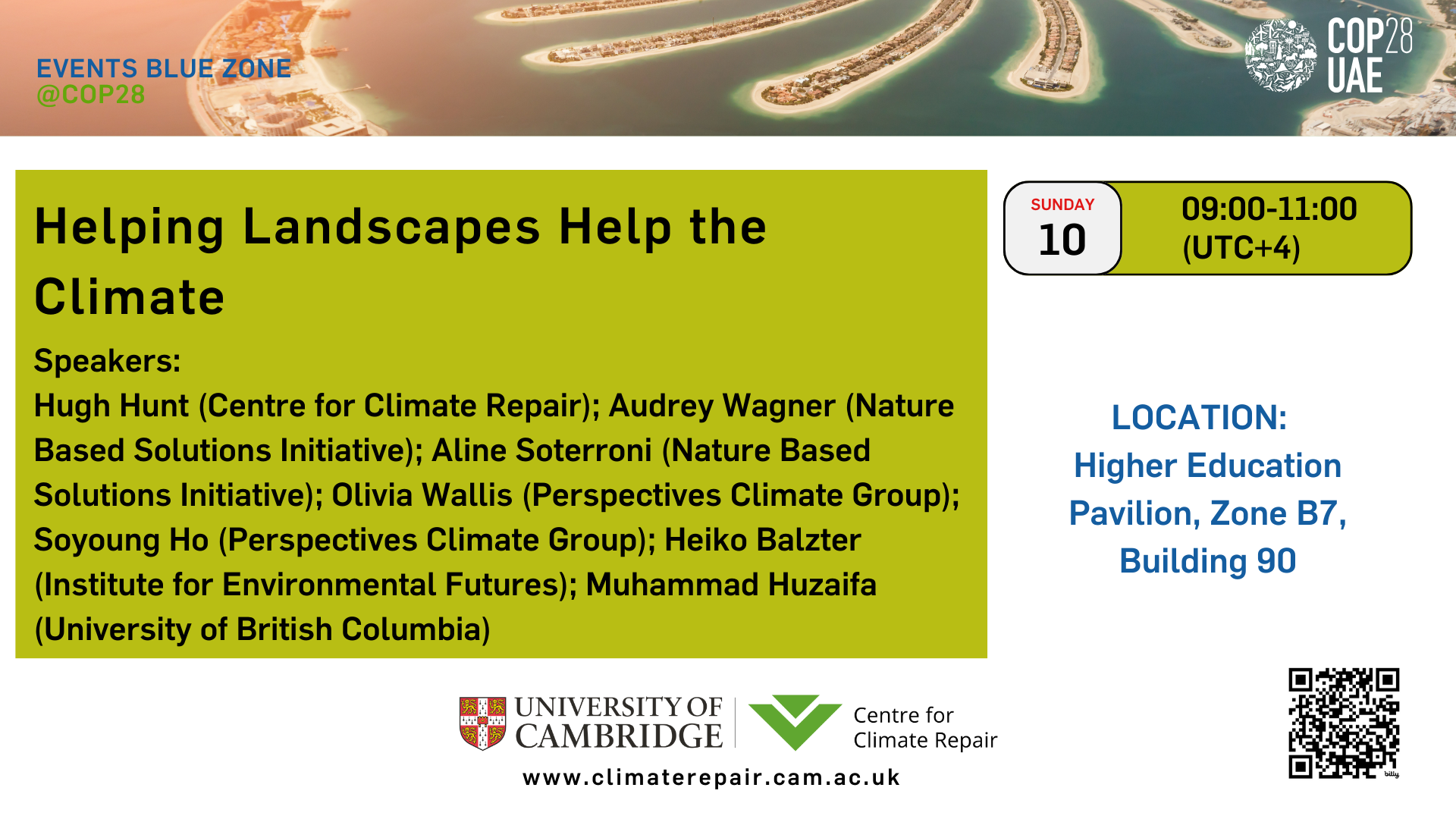
14:00-14:30 No 1.5 without intervention Press Conference Room 2 - Zone B6 - Building 77 (Media Advisory)
Based on even the most ambitious and aggressive emissions reduction and scale-up of greenhouse gas removal scenario now considered, the IPCC shows that global temperatures will go above 1.5°C, with the implication that if we are to keep global temperatures below this level then other interventions are going to be needed. The panel will discuss potential interventions which can help limit global temperatures rises or provide ways to preserve glaciers and sea-ice whilst efforts are increased to not only reduce emissions but reduce levels of greenhouse gases. The panel will discuss a number of different ideas ranging from Marine Cloud Brightening to Seabed Curtains and Thickening of Sea Ice via the pumping of seawater. The panel will highlight the knowledge gaps in all of these approaches and outline the steps needed to help equip society with sufficient understanding to make informed decisions about potential deployment.
Chair Regina Valdez, Speakers: Anni Pokela, Operaatio Arktis, Hugh Hunt, Deputy Director, Centre for Climate Repair, University of Cambridge, James Hansen, Director of Climate Science, Awareness and Solutions, Earth Institute, Columbia University
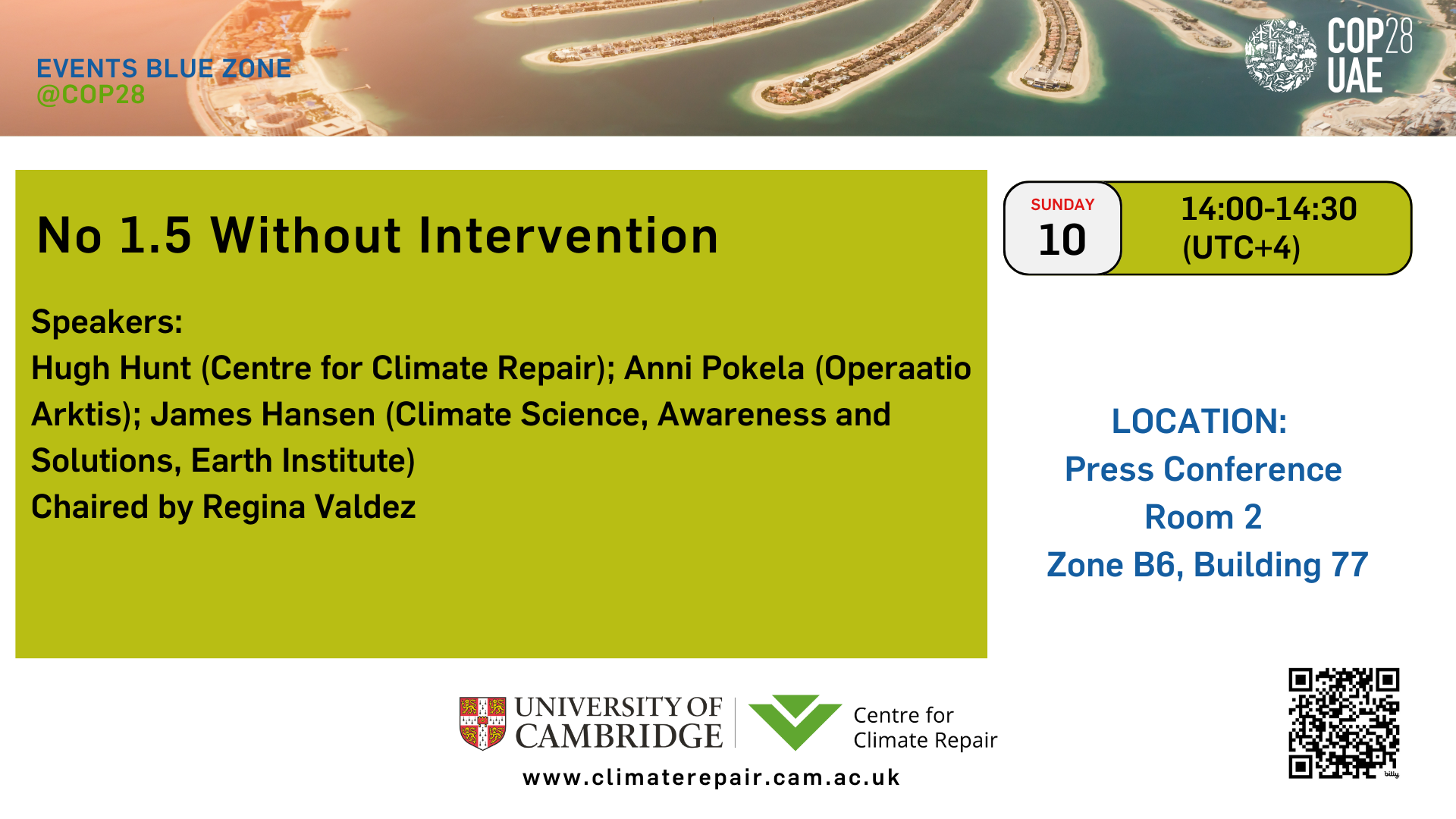
14:00-15:00 Geoengineering – Mad or not? Why the Nordics Should Take the Lead, Finland Pavilion, Zone B6, Building 74
Geoengineering is necessary if we are to keep below 1.5°C and avoid crossing some earth system tipping points. Led by youth-led think tank Operaatio Arktis speakers will discuss the role of Nordic countries in solar radiation management and ice sheet conservation R&D and governance.
Speakers: Marianne Hagen, Uarctic Tipping Point Actions, Shaun Fitzgerald Centre for Climate Repair, University of Cambridge, UK, Anton Keskinen, Operaatio Arktis
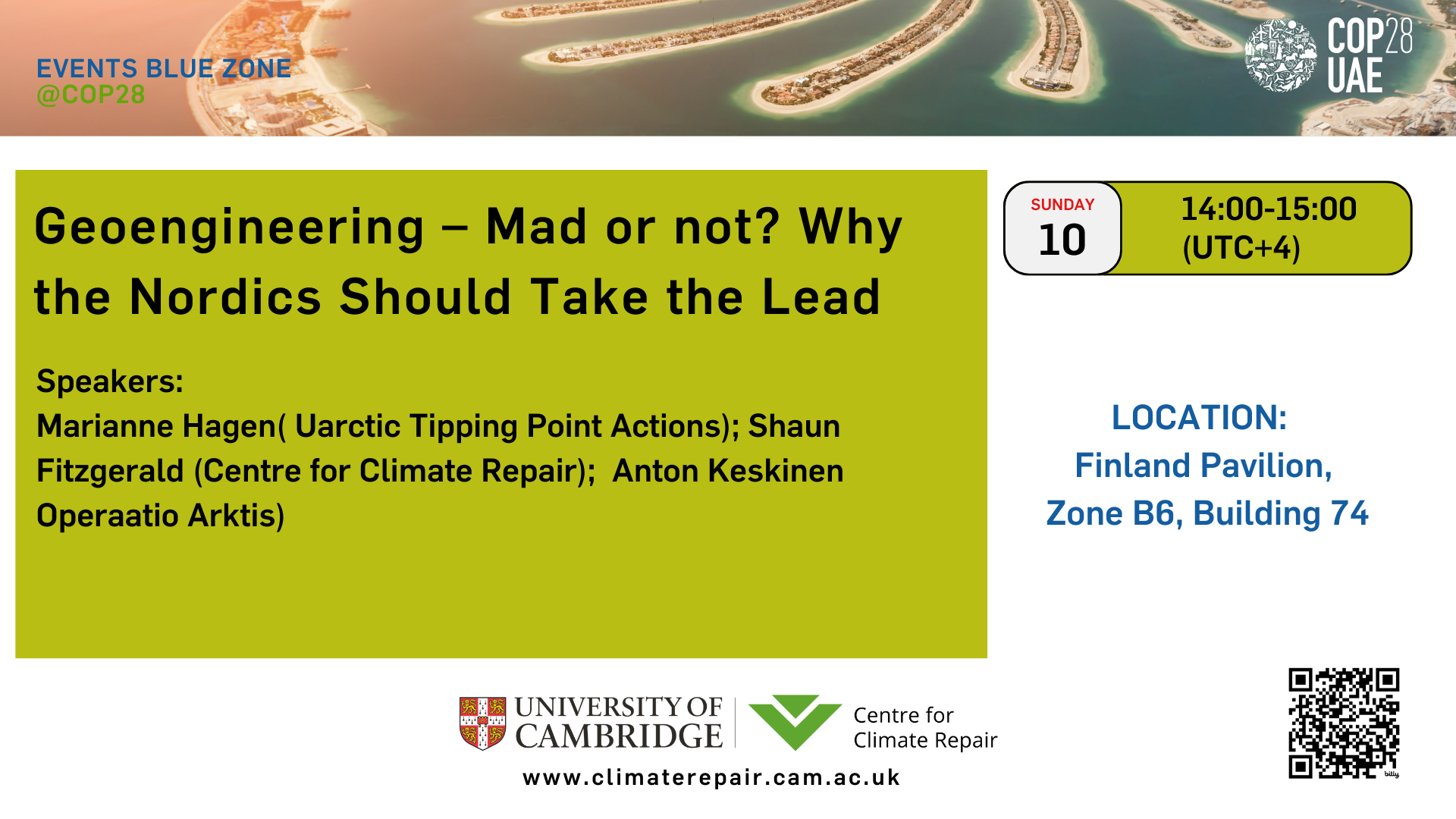
11 December
8:00-9:30 Ocean Based Carbon Dioxide Removal, Ocean Pavilion, Zone B7, Building 87
The oceans have a huge storage capacity for carbon and need to be a part of any climate solution, in addition to the reduction of emissions. With the urgency of the climate crisis and the growing investment in commercial Carbon Dioxide Removal (CDR) markets, interest in mCDR is increasing rapidly. However, many uncertainties remain about the ecological consequences, the efficiencies and permanence of carbon sequestration, and whether any of the potential approaches can provide quantifiable climatic benefits.
This panel will explore the challenges and opportunities for mCDR as well as the potential for oceans to be part of our climate solutions following a responsible and ethical code of conduct that prioritizes activities for the collective benefit of our planet.
Our panellists have extensive knowledge of different mCDR approaches and crucially the different characteristics which they exhibit as well as the challenges faced in evaluating and comparing them. The event seeks further to initiate a discussion on potential roadmaps for development of mCDR, the different programmes underway in the research community, and then importantly to draw questions from the audience.
Speakers: Shaun Fitzgerald, Director, Ken Buesseler, Senior Scientist, Woods Hole Oceanographic Institution, USA, Paul Holthus, Founding President and CEO, World Ocean Council, Chelsey Baker, Ocean Biogeochemical Data and Model Analyst, National Oceanography Centre, UK, Leonardo Valenzuela Pérez, Director of International Partnerships, Ocean Visions, USA, Romany Webb, Deputy Director, Sabin Center for Climate Change Law, Columbia University, USA (online)
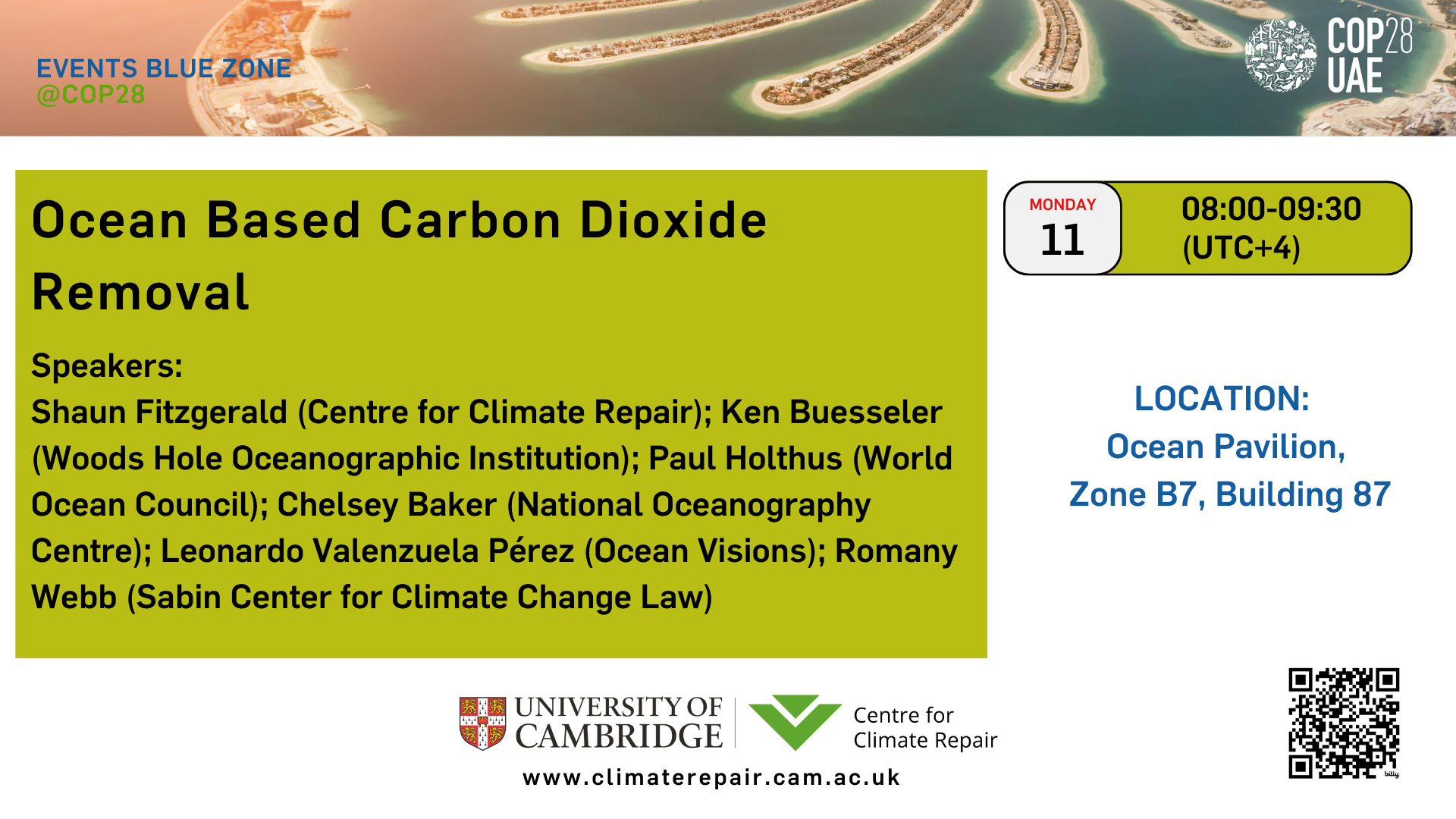
10:45-11:30 Can a Seabed Curtain Delay Global Sea Level Rise, Nordic Pavilion, Zone B6, Building 75
What's next? The debate is tabu. Even though it is extremely likely that global warming will exceed the 1.5 C threshold (IPCC ARG WG2), and IEA states that we are on a path to a 2,4C increase. This surpasses several tipping point thresholds – glaciers in Greenland and West Antarctica, the summer Arctic sea ice and permafrost. At the end of another COP where the parties have repeated their commitment to goals they have limited intentions to actually reaching, we need to explore what we can do to delay, minimize or prevent the worst consequences of our failure to deliver on the Paris-agreement. The panel will explore geoengineering with a youth and global south perspective, focusing on the Seabed Curtain project.
Speakers: Marianne Hagen, Uarctic Tipping Point Actions, Ilana Seid, UN Ambassador of Palau, Hugh Hunt, Deputy Director, Centre for Climate Repair, University of Cambridge, Anton Keskinen , Operaatio Arktis
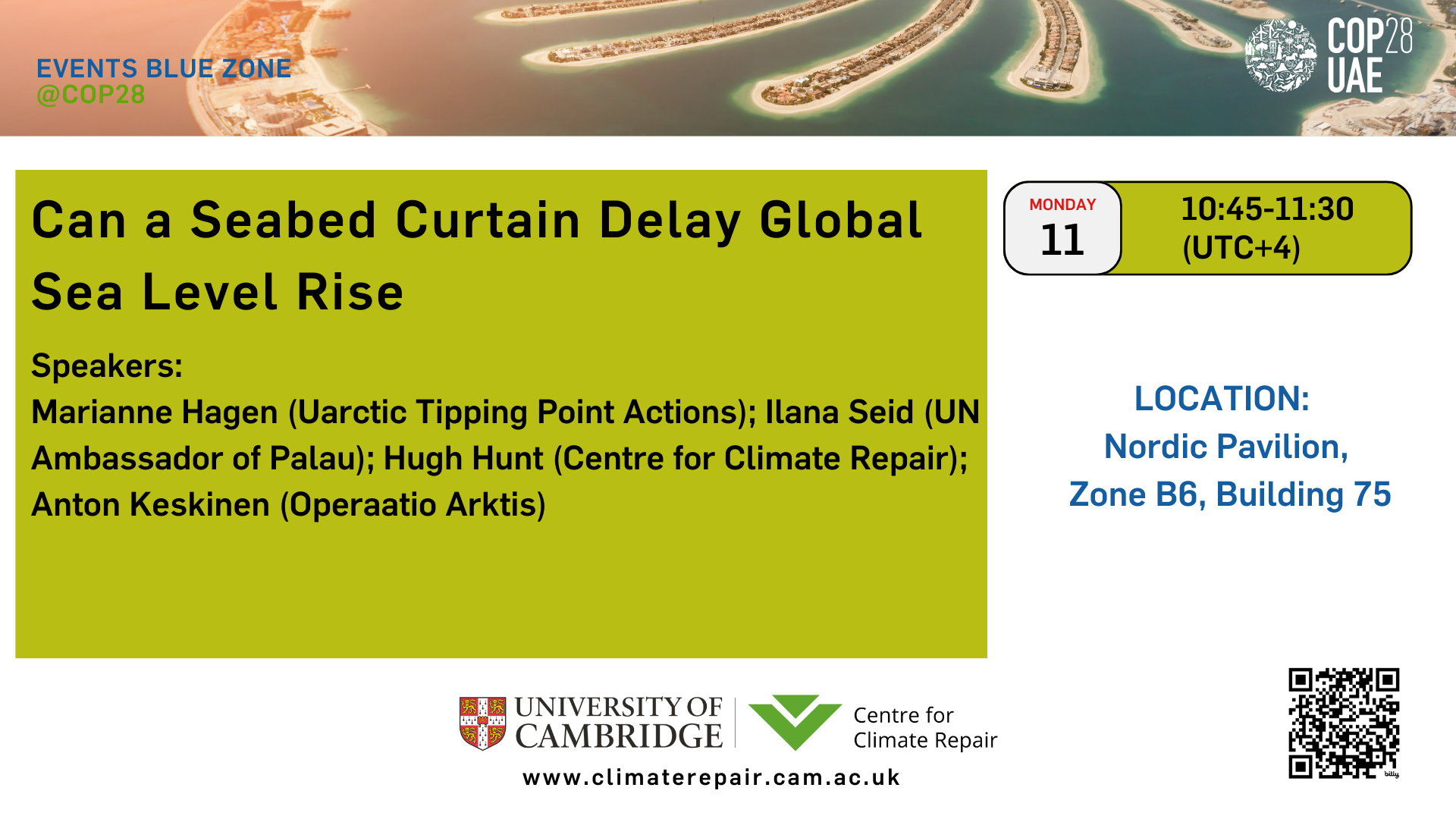
11:15-13:00 It is time to consider climate repair: Can science and technology help to prevent dangerous tipping points? WMO Pavilion, Zone B7, Building 88
Vast amounts of trapped heat energy and changing ocean chemistry, both a direct result from global greenhouse gas emissions, have triggered a cascade of alarming consequences. These include widespread coral reef damage, ocean acidification, and—perhaps most seriously—a rapidly diminishing cryosphere, which plays a pivotal role in ocean-climate regulation. Scientific modeling has demonstrated the very real risks that decarbonization and carbon removal may not cool down the planet before reaching dangerous tipping points.
Given the enormity of these risks, it is prudent to investigate all possible actions that may be able to forestall the passing of dangerous tipping points and further destabilization of the ocean and earth systems. This new field of exploration requires the involvement of many disciplines, sectors, and perspectives, as well as focused attention to paramount matters of safety and governance.
This event will explore critical questions about research on various approaches that may be able to prevent or reverse the loss of critical parts of the earth system (also known as tipping elements) in time to prevent catastrophic scenarios. In this interactive session, attendees will learn about and discuss potential pathways, knowledge gaps, and governance considerations. The session will incorporate diverse perspectives, and it will include recommendations to shape an ambitious agenda.
Speakers: Kerry Nickols, Senior Programme Officer, Ocean Visions, Shaun Fitzgerald, Director, Centre for Climate Repair, others tbc
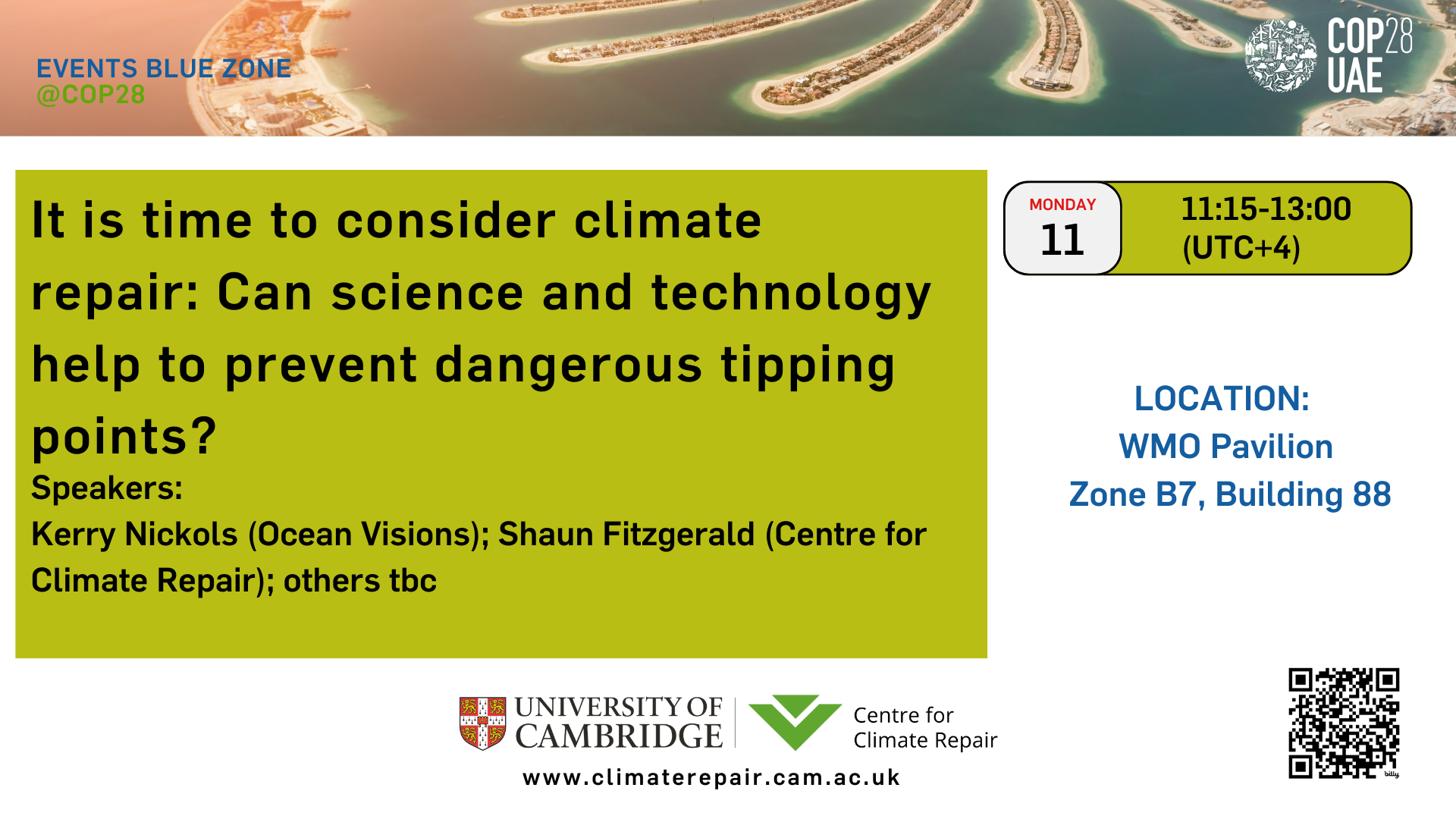
16:45 - 18:15 Ocean Carbon Dioxide Removal: Science, Governance and Policy for safe and transparent implementation, SE Room 5 (official side event), Zone B6, Building 83
The ocean is the planets’ largest carbon reservoir. Interest in using marine spaces to facilitate CDR for climate change mitigation must be based on solid science and address environmental impacts, risks, co-benefits, technical feasibility, cost effectiveness and political/societal acceptance.
Speakers: Shaun Fitzgerald, Director, Centre for Climate Repair, University of Cambridge, UK; Ed Hill Chief Executive (National Oceanography Centre); Ken Buesseler, Senior Scientist, Woods Hole Oceanographic Institution, USA; Paul Holthus, Founding President and CEO, World Ocean Council; Kerry Nickols, Senior Programme Officer, Ocean Visions, USA; Elilini Hoole, Climate Connections Fellow & PhD Researcher, Department of Land Economy, University of Cambridge
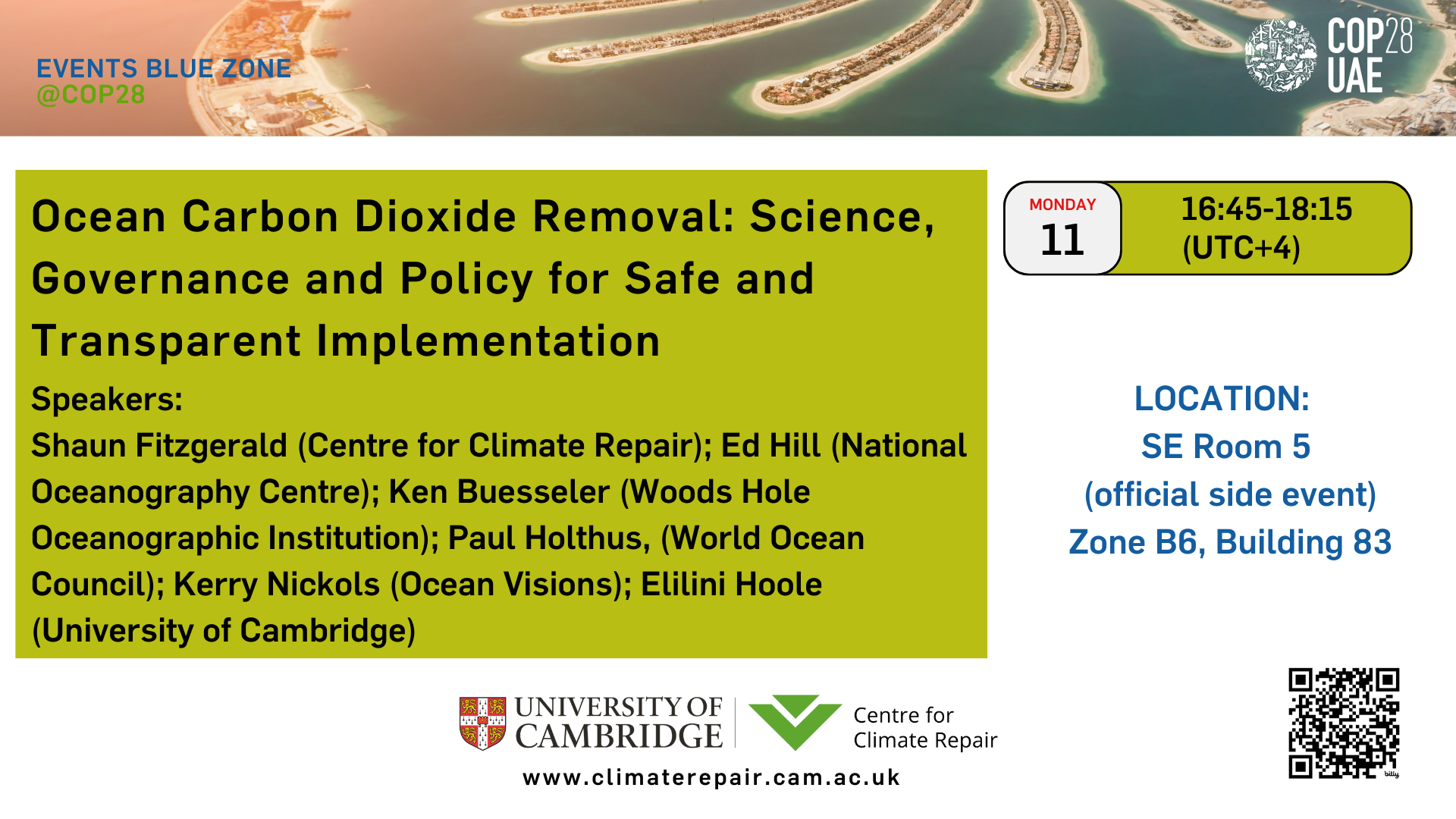
18:05-19:00 Youth at global south: a challenging scenario for action, Indigenous Peoples Pavilion, Zone B7, Building 88
The global south has one of the most important sources of lithium and copper, key resources needed for the energy transition. Moreover, it experiences some of the most intensive insolation which can be used for solar power. Equally, it is home to many indigenous communities experiencing effects of climate change.
Join the dialogue between indigenous peoples from the Atacama Desert and the global south, and learn how they are adapting to and mitigating the climate emergency by using indigenous practices to protect native ecosystems and support climate repair.
Speakers: Freddy Medina, Indigenous Forum on Climate Change Chile; Daniela Gamin, Ancestral authority, Lafkenche - Mapuche People; Mrs. Sonia Ramos, Lickanantai People, leader of the "Ayllu sin Fronteras" movement for preserving the Atacama Salt Flat
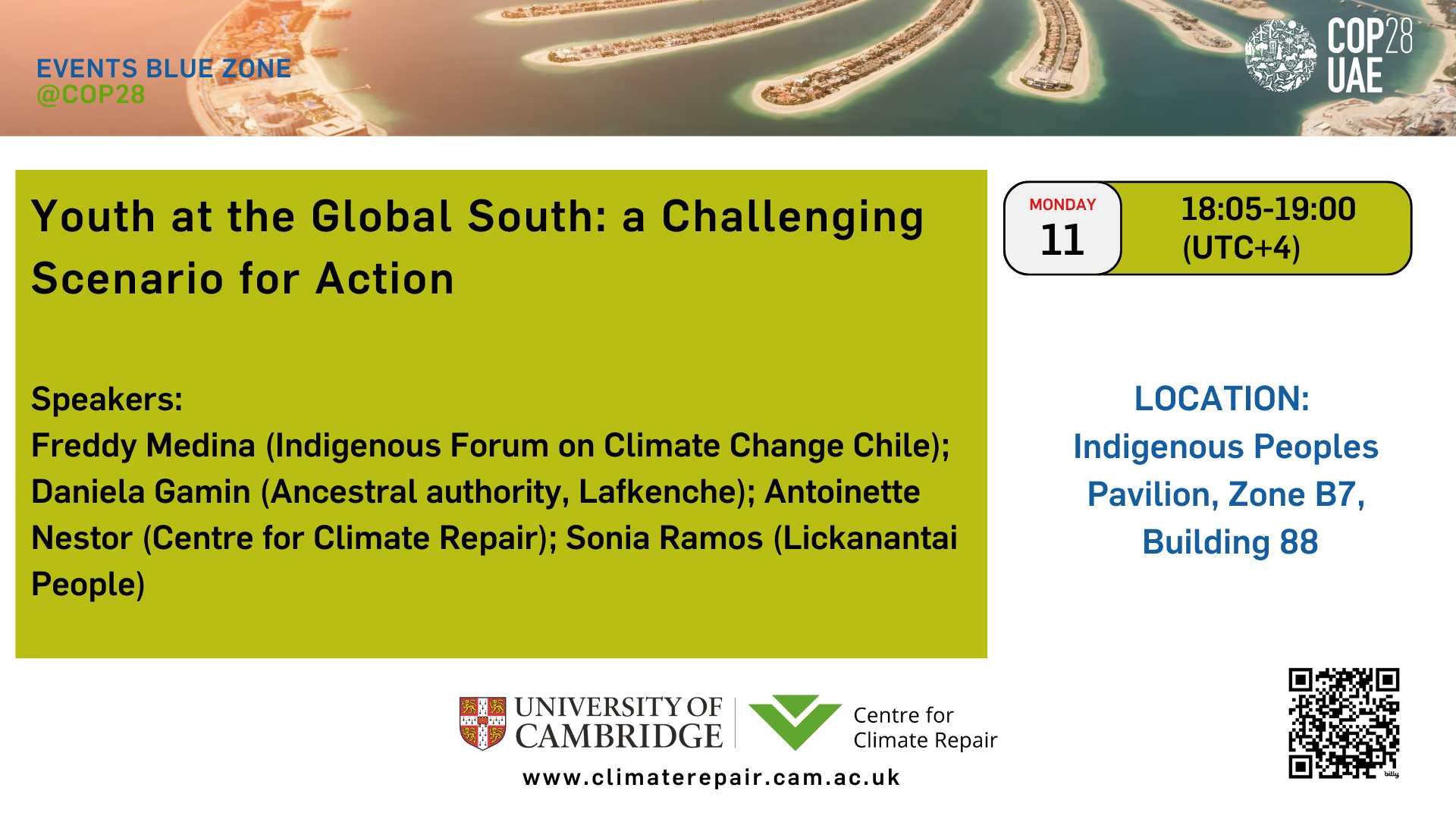
12 December
17:30-18:30 Forest Landscape Restoration: Climate Resilience in East Himalaya Region, IUCN Pavilion (International Union for Conservation of Nature), Zone B7, Building 87
Friendship in collaboration with Conservation International, Bolipara Foundation and Centre for Climate Repair (CCR) seek to shed light on the pivotal role of forests in safeguarding coastal and mountain communities from the escalating threats posed by cyclones and climate change.
The event will explore multifaceted contributions of forests including mangroves, ranging from acting as natural barriers against cyclones and storm surges to providing a critical habitat for biodiversity. Through compelling case studies, best practices, and expert insights, we will delve into the symbiotic relationship between mountains, mangroves, and the livelihoods of coastal and mountain communities, emphasizing the community engagement and socio-economic value of these ecosystems from Bangladesh's experiences. Furthermore, we will discuss innovative conservation and restoration strategies, emphasizing the importance of preserving the multifunctionality of forest landscapes. In our event, we will uncover the potential for sustainable development, climate resilience, and biodiversity conservation in the east Himalayan region and beyond, with mangroves at the forefront of this transformative journey.
Speakers will provide viewpoints about repairing and restoring the ecosystem, by enhancing technologies, ecological leadership and prioritise for international financing mechanisms in LDCs.
Speakers: Runa Khan, Founder and Executive Director, Friendship; Richard Jeo, Conservation International, Antoinette Nestor, Centre for Climate Repair, or Elilini Hoole, PhD student, University of Cambridge UK; Saurav Malhotra, CEO, Balipara Foundation; Md. Amir Hosain Chowdhury, Chief Conservator of Forest Department, Bangladesh; Moderator: Kazi Amdadul Hoque, Senior Director, Friendship
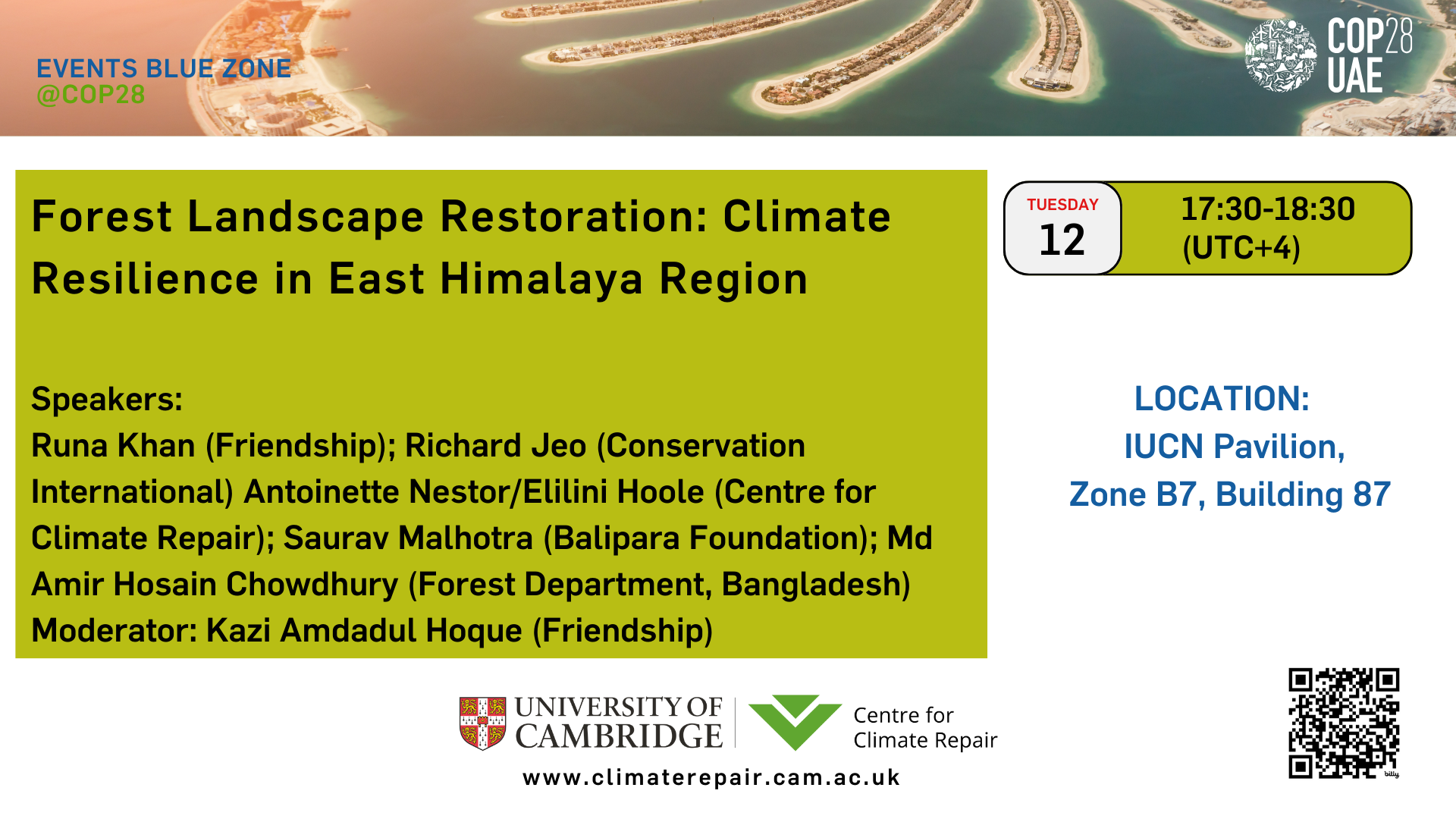
Other Sessions our team members are organising / speaking
5 December
08:00-17:00 Event running in parallel during COP28, University of Middlesex Dubai, Rio de Janeiro Room, Online & In-Person (Register here)
Role of Climate Intervention Law in Furthering the Global Stocktake in promoting resilience and adaptation
Article 10 of the Paris Agreement speaks of research and development with the aim to "improve resilience to climate change and to reduce greenhouse gas emissions" [art 10.1] and to "strengthen cooperative action" [art 10.2]. It also speaks of the need to take into account "available information on efforts related to support on technology development and transfer for developing country Parties" [art 10.6]. But what does this mean when testing the needed technology on the ground?
This panel seeks to answer these questions when conducting climate repair projects as well the views from Bangladesh and their experiences in investing in climate adaptation measures in the most vulnerable areas, to mitigate mass migration altogether. Friendship has integrated, inclusive, and evidence-based climate-adaptive solutions along with financial and legal services/aid to address internal migration and associated challenges and injustices.
Speakers: Prof Tracy Hester (Univ Houston Law Centre); Ms Elilini Hoole (Univ Cambridge); Dr Antoniette Nestor (Centre for Climate Repair); Prof William Burns (Institute for Carbon Removal Law & Policy); Mr Kazi Amdadul Hoque (FRIENDSHIP); Ms Runa Khan (FRIENDSHIP); Adv Ayesha Tahsin Khan (FRIENDSHIP); Princess Marie-Esméralda of Belgium
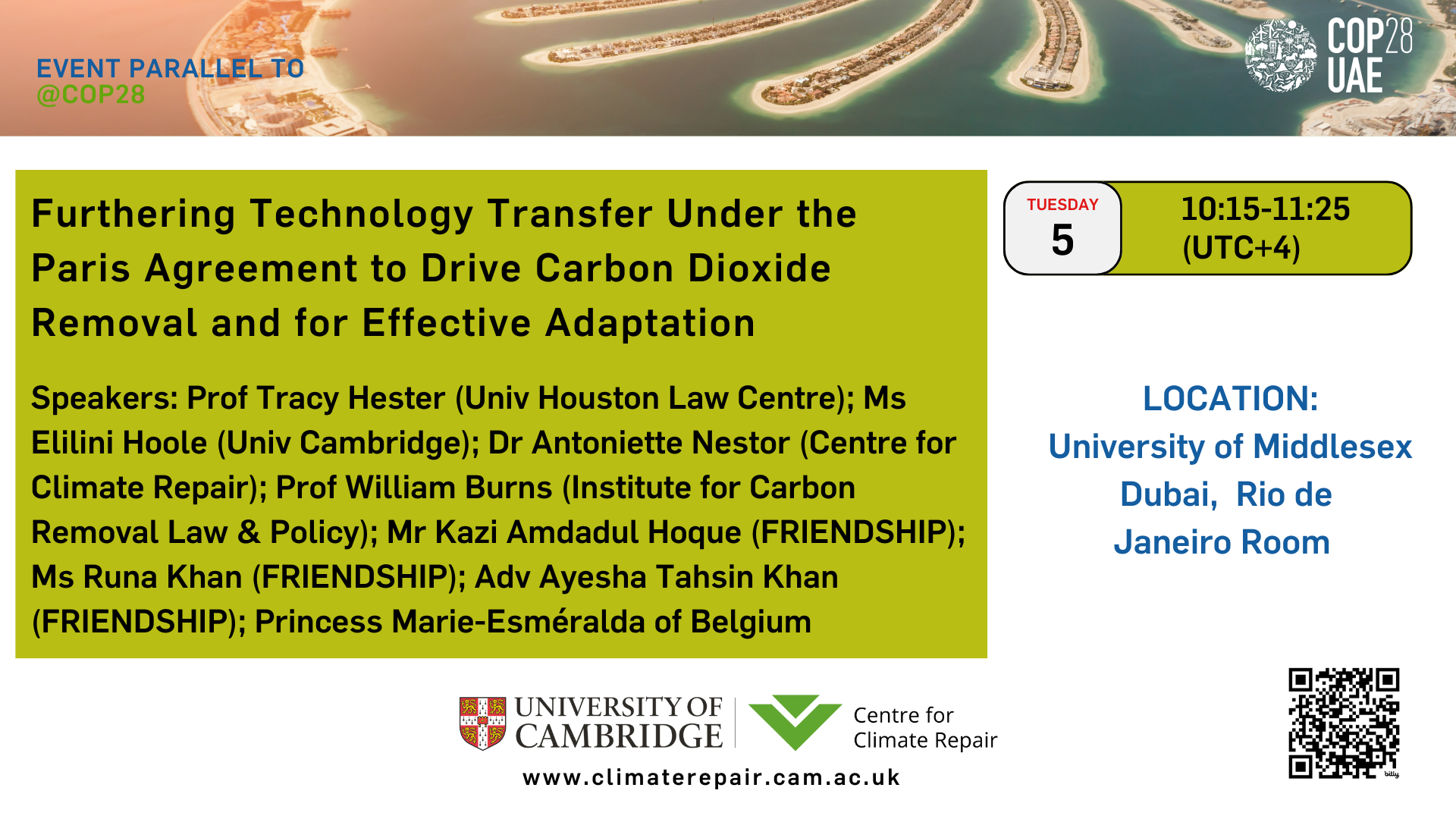
- 16:00-17:00 Inventing a Net Zero World, Mudbadala Pav, Green Zone
Join Fatima Al Kaabi and a range of Youth Inventors from around the world as they delve into a captivating panel discussion on the power of innovation to reshape a sustainable future. Hear firsthand about each person’s visionary ideas on building a sustainable future, the challenges they face, and the groundbreaking solutions they’ve developed. This dynamic conversation is a unique opportunity to witness the essential role of inventors in shaping a brighter and more sustainable tomorrow.
PhD student Yashasvi Raj will be one of the panelists.
9 December
12:00-13:15 I’ll Bill You for Repairs*, Global Alliance of Universities on Climate (GAUC) pavilion, Zone B7, Building 90
Race, gender, economic inequalities and socio-geographical locationality are intersectional injustices that leave least developed countries (LDCs) facing existential threats that are disproportionate to emissions. Despite accounting for 1% of total world CO2 in 2019, LDCs bore 69% of worldwide deaths caused by climate-related disasters since 1950. The destruction of global climate systems, from ocean ecosystem diversity to the Arctic, and loss of local ecological wealth, including mangroves, forests and land, disproportionately affect those who are not endowed with the capital to buffer the impacts of climate changes. There arises, therefore, an urgent need to repair those ecosystems ravaged by climate change. While adaptation and mitigation are the primary focus of climate interventions, a third priority is repairing the very ecosystems that sustain life on earth. This interactive panel explores the importance of climate repair in conversations of climate reparations and how sustainability transitions can play a role in advancing them.
Speakers: Pedro Schilling de Carvalho, Assistant Professor of Financial and Environmental at UCL Faculty of Laws & Consultant at the World Bank Group; Karry Jiao, Consultant, the World Bank; PhD student, Center of Development Studies, POLIS, University of Cambridge; Elilini Hoole, PhD Student & Climate Connections Fellow, Department of Land Economy, University of Cambridge; Tejas Rao, PhD Researcher, Department of Land Economy/C-EENRG, University of Cambridge; Dr Antoinette Nestor, Research Associate, Lucy Cavendish College, Engagement Manager Centre for Climate Repair, University of Cambridge.
(*this is part of the Climate Law, Governance and Sustainability Transitions half-day programme organised by Dr Antoinette Nestor)
10 December
17:00-19:00 Climate Law in Highly Vulnerable Countries, Sierra Leon Pavilion, Zone B5, Building 60
How can international and domestic legal innovations support vulnerable countries' response to climate change impacts, especially in Africa? What can recent developments in international instruments and dispute settlement, including through loss and damage response fund negotiations and advisory opinions, contribute? What domestic legal reforms are needed for finance, adaptation and resilience, and how to build capacity to advance them successfully?
Join lead counsel, fellows and government representative on this discussion about the law. Team member Dr Antoinette Nestor will be speaking about activating international legal mechanism for high vulnerable countries.
Further details tbc.
Background information – CCR participation at COP28
The Centre for Climate Repair, University of Cambridge is hosting events which open up the thinking in the COP28 event to actions beyond Emissions Reduction. Whilst emissions reductions are of course absolutely critical, there is no pathway to 1.5C considered by the IPCC which relies just on rapid decarbonisation. But most of the actions being considered in the COP process are focused on emissions reduction.
We are engaging audiences using a range of panellists from different backgrounds, contexts and ages in order to stimulate discussion and thought as to other potential actions which we might consider. These include a range of Greenhouse Gas Removal (GGR) approaches spanning from purely nature-based ones to fully engineered solutions.
We are also looking at the timescales involved in scaling up GGR approaches and think further about what this means for vulnerable communities, and what actions could be considered to help stave off the worst effects of climate change whilst scale-up of GGR occurs. There are various ideas for Refreezing the Arctic including Marine Cloud Brightening, Stratospheric Aerosol Injection and even pumping of sea water onto the top of sea ice. However, none of these have been properly developed and we will discuss the challenges involved in furthering our understanding of these technologies, and whether they could in fact help in the journey to a 1.5C world.

